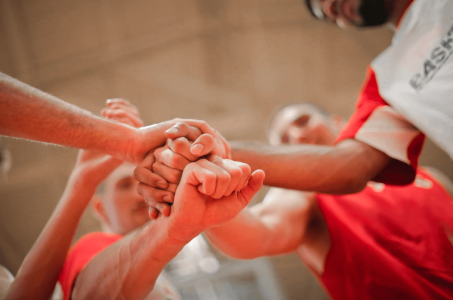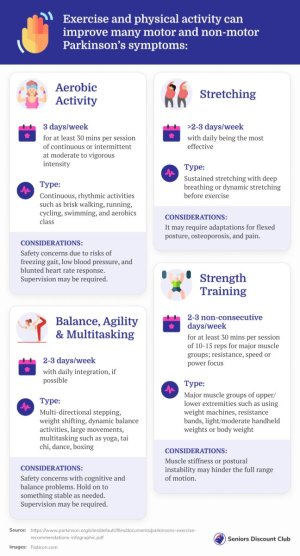How punching bags have helped a 66-year-old Aussie regain control of his life despite a Parkinson's diagnosis
- Replies 4
In the back of a Melbourne community gym, surrounded by speed bags, mirrors, and posters of professional athletes, the air is charged with energy and determination. A chorus of determined voices cries out loud: 'Fight Parkinson's!'
Leading the charge is Daryl 'Dazza' Kennedy, a 66-year-old powerhouse whose indomitable spirit and unwavering courage are a beacon of hope for all who attend the Parkinson's boxing class.
Despite being diagnosed with Parkinson's disease in 2019, Daryl has refused to let this condition defeat him. Instead, he has turned to the unexpected world of boxing, finding solace, strength, and a renewed sense of empowerment.

Daryl's diagnosis of Parkinson's disease was a crushing blow, especially for a man who had always led an active and healthy lifestyle.
He was a force to be reckoned with, having completed three gruelling Melbourne marathons and regularly taking 5-kilometre runs during lunch breaks at his job as a technical officer at Telstra.
When Parkinson's struck, it felt like his world had been turned upside down. Suddenly, the activities he had once taken for granted were a struggle.
Parkinson's disease is a devastating neurological condition affecting approximately 150,000 Australians, with an average of 38 new diagnoses daily. Despite ongoing research efforts, there is currently no known cure for the disease, and those who suffer from it must grapple with a host of debilitating symptoms.
For Daryl, the progression of the disease has had a profound impact on his life. In addition to the common symptoms of loss of balance and coordination, stiffness in limbs, and reduced fine motor skills, Parkinson's has also robbed him of his sense of smell, making everyday activities that much more challenging.
Daryl refused to let his diagnosis defeat him, and he found something that threw him a lifeline: boxing. While it might seem counterintuitive to take up a sport that requires balance, timing, rhythm, and coordination – all skills affected by Parkinson's – boxing has proven to be an effective therapy for those battling the disease.
At the St Kilda PCYC gym, led by the passionate and dedicated trainer Brooklynn Baker, a specialised boxing program is offered for people living with Parkinson's. The program was developed in the United States in 2006 and has been adapted to help Parkinson's patients maintain the skills they need for as long as possible.
'Boxing gives them empowerment over their bodies,' Ms Baker says. 'When the symptoms come, they can feel out of control. Boxing gives them control again. It gives them confidence.'
The classes are highly adaptable, catering to each individual's different abilities and limitations. There is no fighting or sparring, despite the presence of a boxing ring. Instead, the sessions focus on bag work, pad work, and mastering footwork. The community within the class is tight-knit, offering not just physical benefits but strong emotional support.

For Daryl and others like him, boxing has become much more than just a sport. It's a lifeline, a way to stay active, engaged, and empowered in the face of a devastating disease.
For the group, boxing has been much more than just a form of exercise. It has also become a healing experience to share an activity with others who are suffering from Parkinson's. 'Everyone experiences Parkinson's differently,' he says. 'This gives us a source of information, like bringing a library collection together and helping each other through that library.'
Through boxing, Daryl has found a renewed fighting spirit and regained some control over his body and life. His face lights up when he lands a good hit, and his fellow participants share the same sentiment, taking each victory as a sign that they're not powerless against the disease.
While the trend of offering boxing classes specifically for those living with Parkinson's is still limited, it is crucial for helping individuals stay active, connected, and engaged in their fight against the disease.
As Daryl puts it, 'Never give up... This disease wants to take me. Well, it's going to have a fight.'

Daryl's inspiring story reminds us that sometimes the most unconventional solutions can be the most effective ones. By using boxing to combat the symptoms of Parkinson's disease, Daryl has found a sense of empowerment and control over his body and life.
While there is currently no cure for Parkinson's, classes like the ones offered at the St Kilda PCYC gym offer hope and support for those living with the disease. The strong sense of community and emotional support these classes provide are just as important as their physical benefits.
As we continue to explore new and innovative ways to combat Parkinson's disease, it is essential to remember the importance of staying active, engaged, and connected. Whether it's through boxing or other forms of exercise, maintaining a healthy and active lifestyle can make a significant difference in the fight against Parkinson's. As always, any medical concerns should be discussed with your GP.
So, what do you think about this story? Have you or anyone you know been affected by Parkinson's disease? Do you believe that unconventional forms of exercise, like boxing, can be effective in managing the symptoms of the disease? We would love to hear your thoughts in the comments below.
Leading the charge is Daryl 'Dazza' Kennedy, a 66-year-old powerhouse whose indomitable spirit and unwavering courage are a beacon of hope for all who attend the Parkinson's boxing class.
Despite being diagnosed with Parkinson's disease in 2019, Daryl has refused to let this condition defeat him. Instead, he has turned to the unexpected world of boxing, finding solace, strength, and a renewed sense of empowerment.

A 66-year-old man diagnosed with Parkinson's disease participates in a boxing program designed for those living with the condition. Credit: Unsplash/Kenny Eliason.
Daryl's diagnosis of Parkinson's disease was a crushing blow, especially for a man who had always led an active and healthy lifestyle.
He was a force to be reckoned with, having completed three gruelling Melbourne marathons and regularly taking 5-kilometre runs during lunch breaks at his job as a technical officer at Telstra.
When Parkinson's struck, it felt like his world had been turned upside down. Suddenly, the activities he had once taken for granted were a struggle.
Parkinson's disease is a devastating neurological condition affecting approximately 150,000 Australians, with an average of 38 new diagnoses daily. Despite ongoing research efforts, there is currently no known cure for the disease, and those who suffer from it must grapple with a host of debilitating symptoms.
For Daryl, the progression of the disease has had a profound impact on his life. In addition to the common symptoms of loss of balance and coordination, stiffness in limbs, and reduced fine motor skills, Parkinson's has also robbed him of his sense of smell, making everyday activities that much more challenging.
Daryl refused to let his diagnosis defeat him, and he found something that threw him a lifeline: boxing. While it might seem counterintuitive to take up a sport that requires balance, timing, rhythm, and coordination – all skills affected by Parkinson's – boxing has proven to be an effective therapy for those battling the disease.
At the St Kilda PCYC gym, led by the passionate and dedicated trainer Brooklynn Baker, a specialised boxing program is offered for people living with Parkinson's. The program was developed in the United States in 2006 and has been adapted to help Parkinson's patients maintain the skills they need for as long as possible.
'Boxing gives them empowerment over their bodies,' Ms Baker says. 'When the symptoms come, they can feel out of control. Boxing gives them control again. It gives them confidence.'
The classes are highly adaptable, catering to each individual's different abilities and limitations. There is no fighting or sparring, despite the presence of a boxing ring. Instead, the sessions focus on bag work, pad work, and mastering footwork. The community within the class is tight-knit, offering not just physical benefits but strong emotional support.

Sharing an activity with others who have Parkinson's provides emotional support and camaraderie for those involved. Credit: Pexels/Andrea Piacquadio.
For Daryl and others like him, boxing has become much more than just a sport. It's a lifeline, a way to stay active, engaged, and empowered in the face of a devastating disease.
For the group, boxing has been much more than just a form of exercise. It has also become a healing experience to share an activity with others who are suffering from Parkinson's. 'Everyone experiences Parkinson's differently,' he says. 'This gives us a source of information, like bringing a library collection together and helping each other through that library.'
Through boxing, Daryl has found a renewed fighting spirit and regained some control over his body and life. His face lights up when he lands a good hit, and his fellow participants share the same sentiment, taking each victory as a sign that they're not powerless against the disease.
While the trend of offering boxing classes specifically for those living with Parkinson's is still limited, it is crucial for helping individuals stay active, connected, and engaged in their fight against the disease.
As Daryl puts it, 'Never give up... This disease wants to take me. Well, it's going to have a fight.'
Key Takeaways
- Daryl Kennedy, a 66-year-old Aussie diagnosed with Parkinson's disease, found solace and empowerment in the unlikely realm of boxing.
- Led by the passionate and dedicated trainer, Brooklynn Baker, the St Kilda PCYC gym offers a specialised boxing program for people living with Parkinson's.
- Through boxing, Daryl has found a renewed fighting spirit and regained some control over his body and life, and he encourages others never to give up the fight against the disease.
Daryl's inspiring story reminds us that sometimes the most unconventional solutions can be the most effective ones. By using boxing to combat the symptoms of Parkinson's disease, Daryl has found a sense of empowerment and control over his body and life.
While there is currently no cure for Parkinson's, classes like the ones offered at the St Kilda PCYC gym offer hope and support for those living with the disease. The strong sense of community and emotional support these classes provide are just as important as their physical benefits.
As we continue to explore new and innovative ways to combat Parkinson's disease, it is essential to remember the importance of staying active, engaged, and connected. Whether it's through boxing or other forms of exercise, maintaining a healthy and active lifestyle can make a significant difference in the fight against Parkinson's. As always, any medical concerns should be discussed with your GP.
So, what do you think about this story? Have you or anyone you know been affected by Parkinson's disease? Do you believe that unconventional forms of exercise, like boxing, can be effective in managing the symptoms of the disease? We would love to hear your thoughts in the comments below.








